|
|
|
Sort Order |
|
|
|
Items / Page
|
|
|
|
|
|
|
| Srl | Item |
| 1 |
ID:
141758
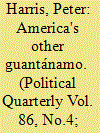

|
|
|
|
|
| Summary/Abstract |
The British Indian Ocean Territory (BIOT) is one of Britain's most controversial Overseas Territories. Its indigenous people, the Chagossians, were exiled from their homes in the 1960s and 1970s so that BIOT could play host to a US military base on the island of Diego Garcia. Meanwhile, Diego Garcia has been tarnished by revelations regarding its role in the CIA's ‘extraordinary rendition’ programme and by allegations of torture. And earlier this year, an international tribunal ruled that the UK government had violated international law by pushing through a Marine Protected Area to cover the territory over and above the protestations of neighbouring states. In this article, I argue that allowing the resettlement of BIOT by the Chagossians would go a long way towards improving the way that the territory has been governed for the past five decades.
|
|
|
|
|
|
|
|
|
|
|
|
|
|
|
|
| 2 |
ID:
144645
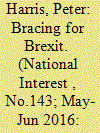

|
|
|
|
|
| Summary/Abstract |
TWENTY-FIVE years ago, Sir Geoffrey Howe resigned as deputy prime minister of the United Kingdom in protest of Margaret Thatcher’s staunch anti-Europeanism. Howe’s departure from the frontbenches came just two days after Thatcher’s denunciation in Parliament of plans for a European single currency (“No! No! No!”), a moment that has since become totemic of what Howe condemned in his resignation speech as the prime minister’s alacrity to undermine her own ministers over European issues.
|
|
|
|
|
|
|
|
|
|
|
|
|
|
|
|
| 3 |
ID:
181626
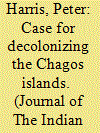

|
|
|
| 4 |
ID:
184763
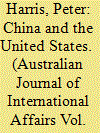

|
|
|
|
|
| Summary/Abstract |
How can ties between the United States and China be restored to good health? In this provocation, I argue that the deterioration of US-China relations has become so severe that it is now incumbent upon China's leaders to pursue the “smart appeasement” of the United States – that is, to take dramatic measures designed to pull the rug from under anti-China forces in America while strengthening the hand of those who wish for more stable and productive Sino-American relations. I acknowledge that the language of appeasement is unlikely to win over many converts in Beijing. But the reality is that China's own national interests – not to mention the broader interests of the international community – are dependent upon America's domestic conversation on China policy taking a sharp turn for the better. Only Chinese leaders have the power to bring about such a shift in how China is perceived in US politics. Simply put, China has no choice but to try to rescue its most important bilateral relationship. In turn, this means something approximating the policy of smart appeasement outlined here.
|
|
|
|
|
|
|
|
|
|
|
|
|
|
|
|
| 5 |
ID:
154183
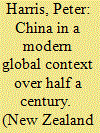

|
|
|
| 6 |
ID:
120480
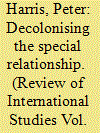

|
|
|
|
|
| Publication |
2013.
|
| Summary/Abstract |
In this article, I challenge the prevailing concept of the UK-US 'special relationship' with a view to improving the concept as an analytic tool for researchers. As it stands, the special relationship draws attention to an uncommonly close bond between two state actors in the post-Second World War period, especially in terms of military cooperation. This conception imposes analytic costs - namely, an elision of imperialism as a feature of Anglo-American relations and a concomitant marginalisation of subaltern social actors. In response, I propose a reconception that posits the subaltern - third parties - as integral to the relationship, thus better capturing the empirical reality of Anglo-American relations past and present. Theoretically, I draw upon postcolonial International Relations scholarship and recent theories of friendship in international politics. Empirically, I present a case study of the US military base on Diego Garcia in the Chagos Islands.
|
|
|
|
|
|
|
|
|
|
|
|
|
|
|
|
| 7 |
ID:
167114
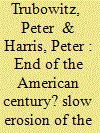

|
|
|
|
|
| Summary/Abstract |
Can the United States continue to shape international politics as it has done for the past 70 years, or is the era of US preponderance coming to an end? Most attempts to answer this question focus on the concept of relative power—that is, the balance of material capabilities between the US and its geopolitical competitors. From this perspective, the ‘American era’ will be over when rival powers are able to muster the military capability to counteract US ambitions on the world stage. In this article, we argue that the most pressing checks on US leadership come not from foreign competitors, but rather from domestic politics. While America's relative power as measured by its military arsenal vis-à-vis those of its rivals has held steady, its ‘usable power’ has declined. We attribute this decline in usable power to three domestic-level factors: the emergence of hyper-partisanship, the absence of a compelling strategic narrative, and the erosion of a social contract of inclusive growth. Our analysis suggests that US leaders will find it difficult to implement a programmatic grand strategy of any description—liberal internationalism, offshore balancing, retrenchment or even President Trump's ‘America First’ strategy—so long as domestic-level dysfunction goes unattended and until usable power is restored.
|
|
|
|
|
|
|
|
|
|
|
|
|
|
|
|
| 8 |
ID:
135210
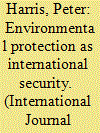

|
|
|
|
|
| Summary/Abstract |
Island bases are integral to US grand strategy in the Asia–Pacific. In this article, I discuss the increasingly common practice of using environmental protection initiatives to secure the Pentagon’s hold on these prized assets. I argue that nature reserves on or around militarized sites on Guam, the Central Pacific islands, and Diego Garcia serve to buttress US political control over the territory concerned. In short, nature reserves in the Pacific and Indian oceans give vital political cover to the island fortresses that they envelop by adding a public relations-friendly rationale for the US military’s occupation of colonized territories as well as an additional layer of politico-legal control.
|
|
|
|
|
|
|
|
|
|
|
|
|
|
|
|
| 9 |
ID:
172663
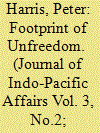

|
|
|
|
|
| Summary/Abstract |
The historical (colonial) origins of the British Indian Ocean Territory as a discrete administrative unit have encumbered the territory with some damaging political pathologies. These problems cannot be remedied by decision makers in London or Washington and will only worsen over time. I conclude that the United States should now back Mauritian sovereignty over the Chagos Islands—not only because supporting decolonization is the ethical and legally required thing to do (although these motivations ought to weigh heavily on US decision makers) but also because there is a hardheaded strategic rationale for preferring Port Louis over London as a landlord.
|
|
|
|
|
|
|
|
|
|
|
|
|
|
|
|
| 10 |
ID:
187970
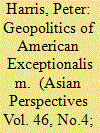

|
|
|
|
|
| Summary/Abstract |
Leaders inside the United States have long tried to maintain favorable external conditions, especially in Eurasia, to protect or advance their domestic agendas. In recent decades, this connection between domestic politics and geopolitical conditions in the “Old World” has incentivized US leaders to pursue a pattern of never-ending military interventions. In turn, the material reality of perpetual engagement in Eurasian affairs has given rise to the pervasive idea that the United States is and must remain an indispensable guarantor of international order. However, these contemporary ideas of American Exceptionalism are dangerously mismatched with the emerging reality of a multipolar world system in which the United States has fewer opportunities to militarily intervene across Eurasia without risking significant repercussions.
|
|
|
|
|
|
|
|
|
|
|
|
|
|
|
|
| 11 |
ID:
186125


|
|
|
|
|
| Summary/Abstract |
The United States (US) cannot reach an agreement with North Korea because US domestic politics will not support the magnitude of concessions that would be required to turn Pyongyang into a denuclearised yet satisfied regional power. While domestic constraints on the US side are not the only (or even the primary) reason for the non-materialisation of a peace agreement between the US and North Korea, they are an overlooked contributing factor. If future attempts are made to mollify the North Korean regime, they will have to be instigated by US regional allies, with Washington playing a supporting role at most.
|
|
|
|
|
|
|
|
|
|
|
|
|
|
|
|
| 12 |
ID:
140822
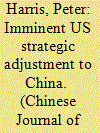

|
|
|
|
|
| Summary/Abstract |
How can leaders in the United States and China ensure that future relations between their two countries are marked by peaceful cooperation and not conflict over the organization of world politics? Whereas most scholarly writing on the topic of China’s ‘peaceful rise’ has dwelt upon the ways and means by which Chinese leaders can steer their ship of state towards harmonious relations with the outside world, this article attempts to shift the focus onto foreign policy-making by the United States. The argument is that established states preside over a range of options when it comes to deciding how to respond to rising states during periods of shifting power and how they choose to adjust to an adverse alteration in relative power has dramatic consequences for the subsequent evolution of any given power-transitional dyad and, by extension, for the course of world politics more broadly. The author provides a conceptual framing of this function for established great powers during episodes of shifting power and seeks to elucidate in particular the domestic–political components of the role. The primary policy implication is to suggest that decision makers in the United States ought to be ready—much more ready than they currently are—to assume a hefty slice of responsibility for the ensuing power transition with China that most observers anticipate to be in the offing.
|
|
|
|
|
|
|
|
|
|
|
|
|
|
|
|
| 13 |
ID:
137613
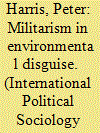

|
|
|
|
|
| Summary/Abstract |
What is the relationship between militarized landscapes, especially overseas military bases, and the natural environment? Scholars have noticed that militarized spaces—permanent bases, demilitarized zones, live fire ranges, training areas, historical battlefields and so forth—are often accompanied by de facto nature reserves. Thus, the unparalleled seclusion that militarization imposes upon delineated geographic spaces can create safe havens for plants and animals that would otherwise suffer from human encroachment. Others retort that military activities cause severe damage to the natural environment. In this article, I problematize attempts to evaluate the environmental impact of militarized spaces in a way that divorces the natural environment from the broader web of social and political relations to which military activities belong. In particular, I argue that environmental issues often serve as “greenwash” to distract attention—lay, scholarly, and official—from the negative aspects of militarism, including instances of environmental degradation, the mistreatment of human subjects, and the perpetuation of colonial forms of government. To illustrate and buttress my argument, I present a detailed case study of the US military base on Diego Garcia in the British Indian Ocean Territory.
|
|
|
|
|
|
|
|
|
|
|
|
|
|
|
|
| 14 |
ID:
031821
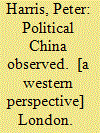

|
|
|
|
|
| Publication |
London, Croom Helm, 1980.
|
| Description |
229p.
|
| Standard Number |
0856646067
|
|
|
|
|
|
|
|
|
|
|
|
Copies: C:1/I:0,R:0,Q:0
Circulation
| Accession# | Call# | Current Location | Status | Policy | Location |
| 018952 | 320.951/HAR 018952 | Main | On Shelf | General | |
|
|
|
|
| 15 |
ID:
038770
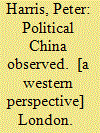

|
|
|
|
|
| Publication |
London, Croom Helm, 1980.
|
| Description |
229p.
|
| Standard Number |
0856646067
|
|
|
|
|
|
|
|
|
|
|
|
Copies: C:1/I:0,R:0,Q:0
Circulation
| Accession# | Call# | Current Location | Status | Policy | Location |
| 027306 | 320.951/HAR 027306 | Main | On Shelf | General | |
|
|
|
|
| 16 |
ID:
177313
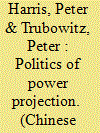

|
|
|
|
|
| Summary/Abstract |
Why did the Obama administration's attempted pivot (or “rebalance”) to Asia fail? In this article, we argue that three interrelated domestic factors are to blame: hyper-partisanship in Washington, DC; the lack of a compelling foreign-policy narrative to make the pivot intelligible and attractive to a broad slice of the political class and domestic public; and the related failure to convince enough Americans that the pivot was necessary to boost their economic fortunes. These domestic stumbling blocks made it impossible for the Obama administration to invest US power assets toward a long-term programmatic endeavor in the Asia-Pacific. In making this argument about the domestic foundations of US power-projection, we improve upon existing explanations of the pivot's undoing that focus on international-level obstacles, problems with the pivot's design and implementation, or the unexpected election of Donald Trump as Obama's successor. We conclude by drawing implications for US power projection beyond the pivot and, indeed, beyond East Asia—suggesting that the US political system has become a weak foundation upon which to build any ambitious foreign-policy superstructure.
|
|
|
|
|
|
|
|
|
|
|
|
|
|
|
|
| 17 |
ID:
136553
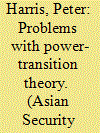

|
|
|
|
|
| Summary/Abstract |
What happens when established states and rising powers meet on the world stage? Is conflict inevitable, or can adroit foreign policies produce peaceful accommodation between jostling Great Powers? Traditional power-transition theory tends to predict conflictual outcomes of shifting power, but this finding does not square with either the historical record or public policy-maker’s own intuitions about how international politics works. In this article, I exegete a central weakness of extant power-transition theory—that is, its reliance on vanishing disparities in national power as an explanatory factor—in order to understand where the theory is failing and how best to proceed with a view to generating greater understanding of geopolitical shifts. Beginning from the starting point that social science theory should generate useful implications for ‘real world’ social and political actors, I argue that power-transition theory’s monocausal vanishing disparities thesis is problematic in three respects: practical, theoretical and empirica
|
|
|
|
|
|
|
|
|
|
|
|
|
|
|
|
| 18 |
ID:
195762


|
|
|
|
|
| Summary/Abstract |
What is the best way to restore or uphold deterrence when an existing deterrent is perceived to have decayed? One common answer is that deterrers should simply add more of the ingredients that generally make for strong deterrents: more certainty that threats will be carried out, more capabilities to inflict severe punishments upon an adversary, and greater capacity to carry out threats with celerity (speed). This answer draws upon an intuitive quantitative logic that more is always better when it comes to dissuading an adversary from taking unwanted actions. In this article, however, we explain how following this quantitative logic can have the unintended consequence of worsening security relations and provoking war, especially under conditions of shifting power. Using proposals for the United States to provide ‘strategic clarity’ regarding its intentions to defend Taiwan against Chinese aggression as a case-study, we show how efforts to maximize the certainty, severity and celerity of threats can backfire in practice. In general terms, our conclusion is that scholars and policy practitioners must assess the viability of deterrents from a qualitative perspective. With specific reference to Taiwan, we find that strategic clarity would be unlikely to strengthen deterrence in the Taiwan Strait.
|
|
|
|
|
|
|
|
|
|
|
|
|
|
|
|
| 19 |
ID:
139579
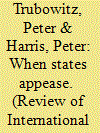

|
|
|
|
|
| Summary/Abstract |
When do states appease their foes? In this article, we argue that governments are most likely to favour appeasing a foreign threat when their top leaders are severely cross–pressured: when the demands for increased security conflict sharply with their domestic political priorities. We develop the deductive argument through a detailed analysis of British appeasement in the 1930s. We show that Neville Chamberlain grappled with a classic dilemma of statecraft: how to reduce the risk of German expansionism while facing acute partisan and electoral incentives to invest resources at home. For Chamberlain, appeasement was a means to reconcile the demands for increased security with what he and his co-partisans were trying to achieve domestically. We conclude by discussing implications of the analysis for theorising about appeasement and about how leaders make grand strategy more generally.
|
|
|
|
|
|
|
|
|
|
|
|
|
|
|
|
| 20 |
ID:
163356
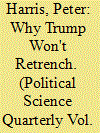

|
|
|
|
|
| Summary/Abstract |
AT THE TIME OF HIS INAUGURATION, it appeared plausible that President Donald J. Trump would deliver the most dramatic shifts in U.S. foreign relations at least since the September 11 terror attacks, probably since the end of the Cold War, and perhaps even—in some important respects—since World War II. As a candidate for office, after all, Trump had made no secret of his disdain for the organizing principles of U.S. foreign policy. He took particular aim at the great edifice of U.S. internationalism, styling himself as an unapologetic nationalist whose “America First” approach to foreign affairs compared favorably with the perfidious “globalism” of his political opponents.
|
|
|
|
|
|
|
|
|
|
|
|
|
|
|
|
|
|
|
|
|